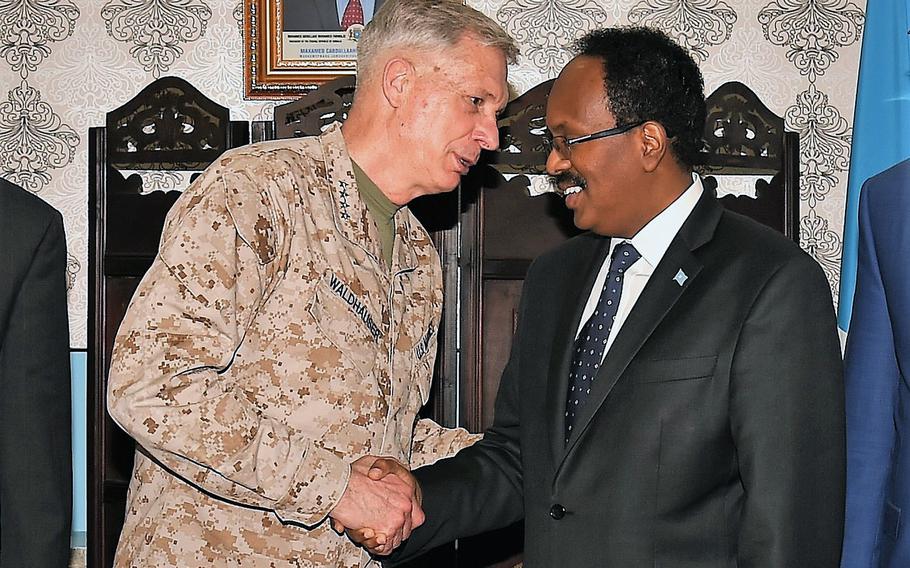
Commander of U.S. Africa Command, U.S. Marine Corps Gen. Thomas D. Waldhauser and President of Somalia Mohamed Abdullahi Mohamed, shake hands after their meeting held at Mogadishu International Airport, Somalia, Saturday, April 29, 2017. (Stars and Stripes)
Top commanders of U.S. Africa Command paid a rare visit to Somalia over the weekend for meetings with political and military officials on bolstering security in the region, where local forces have been engaged in a multiyear battle with the extremist al-Shabab group.
U.S. Marine Corps Gen. Thomas D. Waldhauser, AFRICOM commander, and U.S. Marine Corps Brig. Gen. David J. Furness, the newly appointed Combined Joint Task Force-Horn of Africa commander, flew to the Mogadishu airport for the Saturday talks, the military said Tuesday. They were accompanied by the U.S. ambassador to Somalia, Stephen Schwartz.
“There is no question that al-Shabab has brought great turmoil and has committed extreme atrocities in East Africa, and particularly in Somalia,” said Furness, who assumed command of the Djibouti-based task force on Friday.
“But we are committed to working with partner nations to help Somalia stand strong against this violent extremist organization, and assist with the international and intergovernmental efforts to bring back security and stability to this very important region,” he said in a statement.
The group met with Somali President Mohamed Abdullahi Mohamed and the Somali army chief.
The meeting, the first between Waldhauser and Mohamed, came as the African Union mission to Somalia is scheduled to withdraw in October 2018 amid warnings that time is running out to prepare the country’s fledgling army to lead the fight against al-Shabab.
Those concerns were raised during two days of talks last month with about 40 African defense chiefs at AFRICOM headquarters in Stuttgart, Germany.
Officials are worried that Somalia’s security forces are not competent enough to hold gains achieved by the African Union force, which has waged a bloody campaign to push the Islamist militia out of former strongholds. Leading up to its withdrawal, the union’s Somalia mission said it wants to intensify operations against militants. AFRICOM was recently granted more command authority by the White House to conduct airstrikes against al-Shabab.
“We have very little time, so we need to accelerate this,” Francisco Madeira, the African Union’s special representative on Somalia, said at the Stuttgart talks. “We have to see where we can get resources and training so these people can take over as quickly as possible.”
Medical supplies, clinics, military advisers are all needed, along with more intelligence, surveillance and reconnaissance capabilities, Madeira said.
Before the African Union forces arrived, the militants were on the brink of taking over the entire country. The African troops, drawn mainly from the armies of neighboring countries, delivered a series of defeats to al-Shabab, pushing the insurgents out of numerous stronghold and delivering a degree of security to Mogadishu, Somalia’s capital.
The U.S. military has picked up the pace of its operations during the past two years, sending in special operations forces on a training and advisory mission to improve the capabilities of Somalia’s nascent security forces. About 40 logistics troops from the 101st Airborne Division also recently deployed to the country to train government troops on how to better resupply their forces.
“The first and top priority of AFRICOM is to neutralize al-Shabab and transition the African Union Mission to Somalia,” Furness said. “AMISOM has done yeoman’s work to stabilize Somalia over the last 10 years, and they can be proud of their efforts.”
The Somali president is slated to present a new national security plan next month at a London summit, and Furness said he hoped it would integrate well with U.S. efforts to train, advise and assist Somali security forces.
“With this close partnership, I think the government of Somalia will make a real difference in isolating al-Shabab, eradicating hard-liners and reconciling those who are open to becoming productive members of society,” Furness said.
Stars and Stripes reporter John Vandiver contributed to this report.